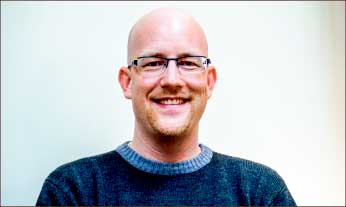Counselor spotlight

Michael Trexler helps students experiencing mental and emotional distress
Deep in the complex corridors of Green Hall sits Michael Trexler within the Liberty University Dean of Students Office. His personal office is warmly lit with lamps and a gray couch nestles the front left corner of the room.

Confidant — Michael Trexler works to assist students through difficult times. Photo credit: Kallie Britton
Trexler is one of many counselors available to Liberty students. For the past four years, he has seen and talked with numerous students struggling with depression, anxiety or other mental and emotional distresses.
October is Mental Health Month and Trexler said the department is doing everything it can to raise awareness and promote its services along with the efforts of Live Healthy Liberty.
As a part of Mental Health Month and Live Healthy Liberty, Student Counseling Services sets up a table every Tuesday morning in DeMoss Hall from 9 a.m.-noon in front of the Career Center.
According to Trexler, the department simply wants students to know it exists and that counselors are available to students free of charge. All a student needs to do is stop by the office.
“We don’t have to go out and get (the students), they come to us,” Trexler said. “There’s no insurance, there’s no billing, so it’s wonderful. This is a really important age. … If someone is going to develop a mental disorder, usually it’s going to surface around these early 20s, when their prefrontal cortex is actually getting fully developed.”
Trexler said historically, depression has been more problematic among college students. However, recently, anxiety is increasingly affecting college students.
According to Trexler, symptoms of depression include loneliness, withdrawal, isolation and low or lack of motivation. Symptoms of anxiety include similar emotional signs as well as feeling on edge, feeling tense and poor concentration. He said the demand of college on students is what causes many to fall into depression or anxiety, especially since the brain is still developing.
“A lot of students are balancing work … school, relationship difficulties (and) conflicts at home,” Trexler said. “And I do believe that disconnecting from (social) media is a really important part (of healing). Just (take) a fast or a break from social media and really (connect) with people.”
Trexler suggested that taking a short pause or break each week from social media is very important. He encourages taking a sabbath day to rest and connect with others.
According to Trexler, the best starting places toward becoming emotionally healthy come in three steps: feel, label and symbolize. He said it is important to truly feel the emotion, not to avoid it or else nothing will change, and then identify the emotion. Finally, he wants students to symbolize the emotion by describing it.
“I think depression and anxiety result from dysregulation of emotion,” Trexler said. “So people need to learn how to regulate emotions.”
We have to stop avoiding the things that are challenging, and we can begin to tolerate emotional experiences that are distressing and move toward them instead of moving away from them.”
According to Trexler, if people do not learn to regulate their emotions, it can turn into a vicious and unhealthy cycle of coping methods, shame and even addiction. He said the students that come through his office usually leave with a better understanding of how to manage their emotions.
Trexler knows that many college students struggle with depression and anxiety and that all these steps to getting healthy are very important. However, he believes that ultimately God brings healing, and it is crucial to put Jesus as the foundation of life.
“My primary counseling philosophy is ‘Love Heals,’” Trexler said. “It doesn’t matter what technique I use, it doesn’t matter what I do with a student, I ultimately believe love is what heals—specifically God’s love.”
Trexler has been a Christian for 15 years and said Jesus is the center of his counseling methods and he hopes to point every student he comes across to Christ.
“I hope to have an interaction between the student and (Jesus), because one touch from him can change anything,” Trexler said. “I want to facilitate a spiritual environment that’s healthy, not pushed upon people, but that’s very relational. I think it’s really important for each of us to encounter God individually. The way I experience God might not be the way you
experience God.”
He also hopes Student Counseling Services can help reduce the stigma about mental health. He believes that everyone can benefit from counseling, no matter how healthy a person is.
When talking about Liberty students, Trexler lights up. He said the heartbeat of the Dean of Students Office has two parts: first, it shouts Jesus, then it shouts students.
“Students are really wonderful,” Trexler said. “I like this job because (students) come here and … the services are confidential. We’re going to facilitate in an open environment that’s going to be non-judgmental, that’s going to accept the student no matter where they are and no matter what they come from.”
Trexler, a native of Indiana, is currently working on his Ph.D at Liberty in Counselor Education and Supervision. He has worked as a one-on-one counselor at Liberty for four years. Before coming to Liberty, he worked with adults and children with mental disabilities for six years.
Liberty Student Counseling Services meets with students for six sessions, one session per week. Each session normally lasts between 45-50 minutes. They offer various types of counseling including individual, group, crisis, referrals to outside mental health agencies, as well as a Celebrate Recovery program. Students can schedule an intake appointment by calling (434) 582-2651 or by emailing studentcounselingservices@liberty.edu.
For more information about Liberty’s Student Counseling services, visit liberty.edu/studentaffairs/studentcare/.
RITTER is a news reporter.
